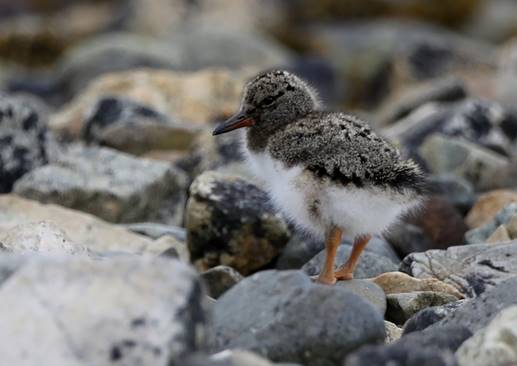Not all birds build their nests in hedges and trees. Some nest on beaches, including the little tern, ringed plover, and oystercatcher.
These species have all seen a decline in their population numbers, and they have been facing increasing threats in recent decades. One major problem is that beaches are being used more frequently as Essex’s population rises. Since these species use the beaches to nest, and their eggs can be difficult to spot, it makes the eggs more prone to being accidentally stepped on or disturbed by dogs off leads. The increased human disturbance is a serious issue since it may lead to birds abandoning their nests, leaving the eggs and chicks vulnerable to predators and the elements.
These beach-nesting species are also threatened by rising sea levels and coastal floods brought on by climate change, which can wash away eggs and flood nests.
In collaboration with the RSPB, Bird Aware Essex, and the Essex Marine Police Unit, Essex Wildlife Trust’s campaign ‘Share our Shores’ urges the public to follow simple guidelines whilst they’re enjoying the beach this summer to ensure endangered beach-nesting birds can lay their eggs and raise their chicks safely on the Essex coastline.
As we move into the warmer months, the nesting season for these species is well underway, with nest and chick sightings already made.
The public can help protect little terns and other beach-nesting birds by following these steps:
1. Know where they are – Colne Point, Old Hall Marshes and Tollesbury Wick beach are amongst the main sites along the Blackwater and Colne Estuaries for breeding birds.
2. Respect zoned-off areas – If you see signage and rope, this is a “no go” zone from April-August as these sites are protected for wildlife.
3. Avoid disturbance by boat – Only land boats on designated moorings and landing areas, keep water spots away from shoreline, minimise noise near breeding sites.
4. Back away – if you see a breeding species, back away. Short, sharp alarm calls will notify you are too close to young.
5. Spread the word – Raise awareness of beach-nesting birds and report bad behaviour to local wildlife crime officers by calling the police on 101.
Alex Smith, Marine & Coastal Engagement Officer for Essex Wildlife Trust, says:
“The Share our Shores project is more important than ever as we are coming into summer when the coastal birds will be busy nesting. It’s been fantastic to see nesting ringed plovers, oystercatchers and little terns across a variety of coastal sites that we have signposted and roped off to help protect them from disturbance. We ask anyone visiting coastal areas to be respectful of nesting birds and all wildlife to help ensure a successful nesting season for these amazing animals.”
For more information, and to download resources for Share our Shores, visit Essex Wildlife Trust’s website: https://www.essexwt.org.uk/get-involved/campaign/share-our-shores




